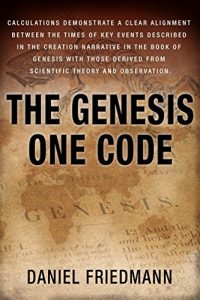Readers' Favorite 2013 International Book Award Winner.
Were the heavens and the earth created 6,000 years ago, as the Biblical Genesis Creation account suggests? Or, did the universe expand into existence nearly 14 billion years ago from a spontaneous "Big Bang" as modern science has described? Both dates cannot be right. Or can they?
Imagine medieval manuscripts, written some 800 years ago, that could help us decipher Genesis chapter 1 and thereby pinpoint exactly when the universe began - an instant squaring, moreover, with our most up-to-date scientific cosmological theories. Further, suppose these same manuscripts could help us extract from Genesis unequivocal timelines for the development of life on Earth, again precisely as identified by the latest scientific evidence derived from the fossil record. The Genesis One Code carefully examines the relationship between scientific theory and biblical teachings. The book approaches the origins debate from a fresh perspective informed by both scientific and spiritual research. The book demonstrates an alignment between the dates of key events as described in Genesis 1 and 2 with those derived from scientific theory and observation. This alignment provides a compelling perspective deserving of thoughtful consideration.
In this book Friedmann:
● places the 6-day creation account side by side with the 13.8 billion year timeline for the development of the universe from science
● shows that texts predating modern science described the Big Bang and contained the right age of the universe
● shows that the appearance of life on earth as depicted by the fossil record matches Genesis chapter 1 in sequence and timing and sheds new light on the creation vs. evolution debate.
● explains that Genesis events are within the laws of nature and thus explainable by the scientific process, as we have discovered- with three exceptions
● the three exceptions match the largest unanswered question in science today and are ex-nihilo creation events unexplainable by the scientific process
Were the heavens and the earth created 6,000 years ago, as the Biblical Genesis Creation account suggests? Or, did the universe expand into existence nearly 14 billion years ago from a spontaneous "Big Bang" as modern science has described? Both dates cannot be right. Or can they?
Imagine medieval manuscripts, written some 800 years ago, that could help us decipher Genesis chapter 1 and thereby pinpoint exactly when the universe began - an instant squaring, moreover, with our most up-to-date scientific cosmological theories. Further, suppose these same manuscripts could help us extract from Genesis unequivocal timelines for the development of life on Earth, again precisely as identified by the latest scientific evidence derived from the fossil record. The Genesis One Code carefully examines the relationship between scientific theory and biblical teachings. The book approaches the origins debate from a fresh perspective informed by both scientific and spiritual research. The book demonstrates an alignment between the dates of key events as described in Genesis 1 and 2 with those derived from scientific theory and observation. This alignment provides a compelling perspective deserving of thoughtful consideration.
In this book Friedmann:
● places the 6-day creation account side by side with the 13.8 billion year timeline for the development of the universe from science
● shows that texts predating modern science described the Big Bang and contained the right age of the universe
● shows that the appearance of life on earth as depicted by the fossil record matches Genesis chapter 1 in sequence and timing and sheds new light on the creation vs. evolution debate.
● explains that Genesis events are within the laws of nature and thus explainable by the scientific process, as we have discovered- with three exceptions
● the three exceptions match the largest unanswered question in science today and are ex-nihilo creation events unexplainable by the scientific process












